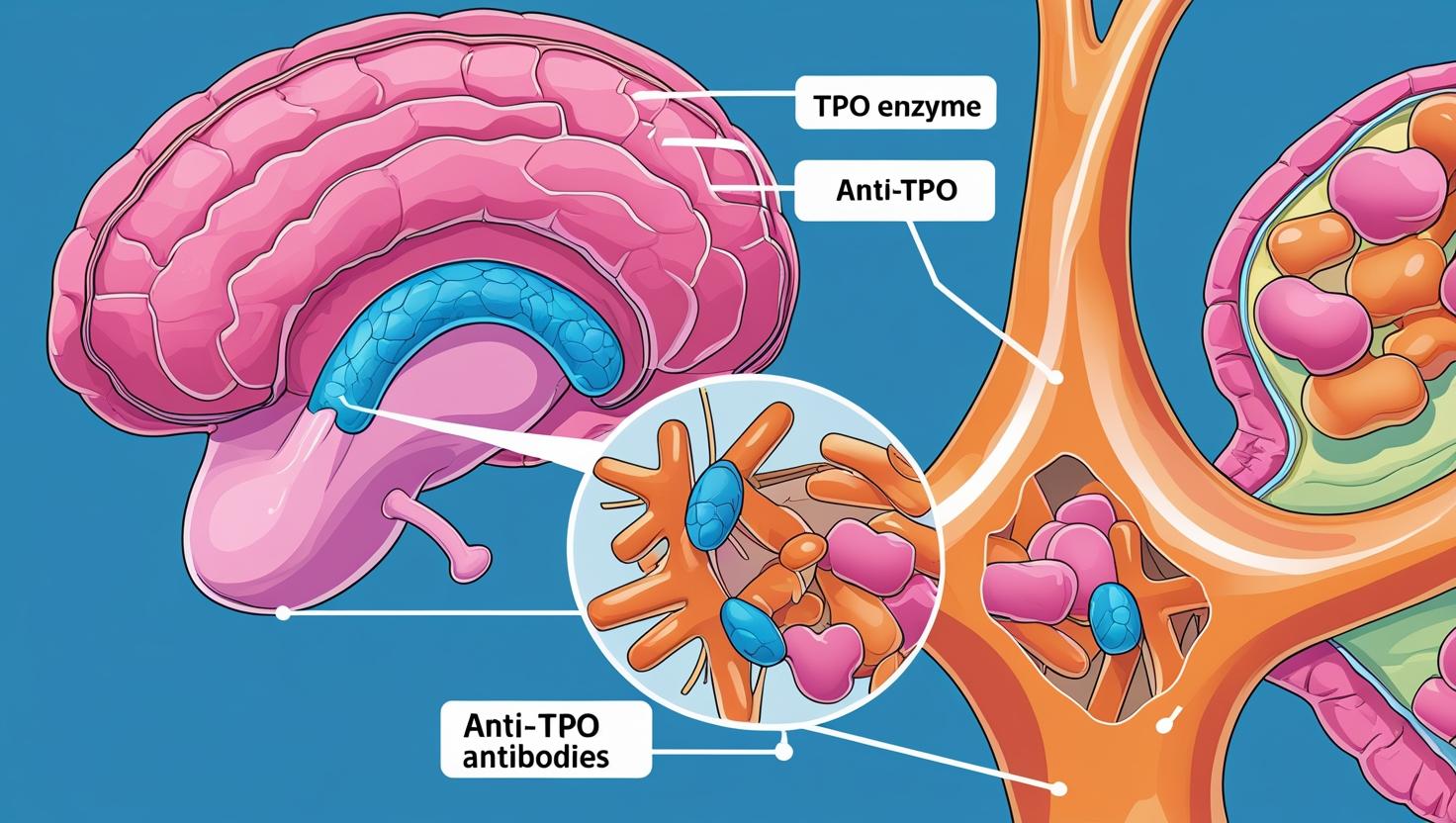Thyroid health plays a crucial role in maintaining overall well-being. The thyroid gland, a small butterfly-shaped organ located at the base of your neck, produces hormones that regulate metabolism, growth, energy balance, and many body functions. When something goes wrong with the thyroid, a wide range of symptoms can appear—from fatigue and weight changes to mood disorders and heart problems.
One important tool for detecting autoimmune thyroid conditions is the Anti-TPO test, also known as the thyroid peroxidase antibody (TPOAb) test. This blood test identifies antibodies directed against thyroid peroxidase (TPO), an essential enzyme in thyroid hormone production. Elevated levels of these antibodies often point toward autoimmune diseases like Hashimoto’s thyroiditis or Graves’ disease.
In this blog, we’ll cover everything you need to know about the Anti-TPO test, including:
- What Anti-TPO is and why it matters
- The role of thyroid peroxidase in hormone synthesis
- When doctors recommend this test
- How the test is performed
- Normal and abnormal results
- Conditions associated with high Anti-TPO antibodies
- Limitations of the test
- Treatment implications and lifestyle considerations
- Frequently asked questions (FAQs)
Let’s dive in.
What is Anti-TPO?
Anti-TPO refers to antibodies produced by your immune system that mistakenly attack thyroid peroxidase (TPO), an enzyme in the thyroid gland. Normally, TPO helps in the production of thyroid hormones (T3 and T4) by enabling the iodination of tyrosine residues on thyroglobulin.
When the immune system sees TPO as a “foreign” substance, it generates antibodies (Anti-TPO). This self-directed attack damages thyroid cells, reduces hormone production, and leads to hypothyroidism or sometimes hyperthyroidism.
Thus, the presence of Anti-TPO antibodies is a key marker of autoimmune thyroid disease.

Why Thyroid Peroxidase Matters
To understand the test, it’s important to know what thyroid peroxidase does:
- Iodide oxidation – Converts iodide (I⁻) into active iodine (I⁺).
- Iodination of tyrosine residues – Attaches iodine to tyrosine molecules on thyroglobulin, forming monoiodotyrosine (MIT) and diiodotyrosine (DIT).
- Coupling reaction – Combines MIT and DIT to form T3 (triiodothyronine) or T4 (thyroxine).
Without TPO, the thyroid cannot efficiently produce hormones. When Anti-TPO antibodies neutralize this enzyme, the gland becomes dysfunctional.
When is the Anti-TPO Test Recommended?
Doctors may order an Anti-TPO test in several clinical situations:
- Unexplained symptoms of thyroid disease – Fatigue, weight changes, hair loss, depression, irregular periods, or palpitations.
- Goiter (thyroid enlargement) – To determine if it’s autoimmune-related.
- Abnormal thyroid hormone tests – High or low TSH, T3, or T4 levels.
- Infertility or recurrent miscarriage – Thyroid autoimmunity can affect pregnancy outcomes.
- Monitoring autoimmune thyroid conditions – To track disease progression.
- Family history of thyroid or autoimmune disease – For early detection in high-risk individuals.
- Pregnancy screening (in select cases) – Especially in women with previous thyroid problems.

How is the Anti-TPO Test Performed?
The Anti-TPO test is simple and safe:
- Sample Collection – A small blood sample is drawn from a vein in your arm.
- Laboratory Analysis – The serum is analyzed using methods like immunoassays (ELISA, chemiluminescence, or radioimmunoassay).
- Results – Usually available within 24–48 hours, depending on the lab.
Preparation
- No fasting is required.
- Inform your doctor about any thyroid medication, supplements (especially iodine or biotin), or autoimmune treatments you are taking.
- Pregnant women should always mention their status, as antibody levels can influence maternal and neonatal health.
Understanding Anti-TPO Test Results
Normal Range
Reference values vary by lab, but typically:
- Negative/Normal: < 35 IU/mL (sometimes < 9 IU/mL depending on the method)
- Borderline/Equivocal: 35–100 IU/mL
- Positive: > 100 IU/mL
⚠️ Note: The exact cut-off may differ. Always interpret results in context with other thyroid tests (TSH, FT4, FT3).
High Anti-TPO Antibody Levels
- Strongly suggest autoimmune thyroid disease.
- Indicate increased risk of developing hypothyroidism, even if TSH and T4 are currently normal.
- In pregnancy, high Anti-TPO increases risk of postpartum thyroiditis and miscarriage.
Low/Negative Levels
- Usually mean no autoimmune thyroid disease.
- But rare cases exist where patients have thyroid autoimmunity without detectable antibodies.
Conditions Associated with High Anti-TPO
- Hashimoto’s Thyroiditis
- Most common cause of hypothyroidism worldwide.
- High Anti-TPO is almost always present.
- Symptoms: fatigue, weight gain, constipation, dry skin, depression, cold intolerance.
- Graves’ Disease
- Autoimmune hyperthyroidism.
- Anti-TPO may be elevated, but Thyroid Stimulating Immunoglobulin (TSI) is more specific.
- Symptoms: weight loss, palpitations, anxiety, tremors, heat intolerance.
- Postpartum Thyroiditis
- Temporary thyroid dysfunction after childbirth.
- Higher risk if Anti-TPO is elevated during pregnancy.
- Other Autoimmune Disorders
- Rheumatoid arthritis, type 1 diabetes, lupus, pernicious anemia—sometimes associated with Anti-TPO positivity.

Illustration comparing symptoms of Hashimoto’s thyroiditis and Graves’ disease with a central thyroid gland highlighted under antibody attack.
- Rheumatoid arthritis, type 1 diabetes, lupus, pernicious anemia—sometimes associated with Anti-TPO positivity.
Limitations of the Anti-TPO Test
- Not a stand-alone diagnostic tool – Must be combined with TSH, T4, and clinical evaluation.
- Cannot distinguish between Hashimoto’s and Graves’ – Only shows autoimmunity, not the specific disease type.
- Antibody levels fluctuate – May rise or fall over time.
- Some healthy individuals test positive – Especially women and elderly people, without significant thyroid dysfunction.
What Happens if Anti-TPO is Positive?
If you test positive for Anti-TPO antibodies:
- Your doctor may order additional tests – TSH, FT4, FT3, thyroid ultrasound.
- If thyroid function is normal – Monitoring may be recommended, since you are at risk of developing hypothyroidism later.
- If hypothyroidism is present – Treatment usually involves levothyroxine (synthetic T4) replacement.
- If hyperthyroidism is present – Treatment may involve anti-thyroid drugs, radioactive iodine, or surgery.

Anti-TPO in Pregnancy
- Around 10–15% of women are Anti-TPO positive during pregnancy.
- Associated with increased risk of:
- Miscarriage
- Preterm delivery
- Postpartum thyroiditis
- Monitoring thyroid function during and after pregnancy is crucial.
- In some cases, doctors may start low-dose levothyroxine to reduce risk.
Lifestyle Considerations for High Anti-TPO
While you cannot directly “cure” autoimmune thyroid disease, lifestyle adjustments may help manage symptoms and support thyroid health:
- Balanced diet – Adequate iodine, selenium, zinc, and vitamin D.
- Avoid excess iodine – Too much can worsen autoimmune thyroiditis.
- Gluten-free diet (in some cases) – Some studies show improvement in thyroid autoimmunity in patients with celiac disease.
- Stress management – Yoga, meditation, and adequate sleep reduce autoimmune flare-ups.
- Regular exercise – Helps energy balance and metabolism.
Anti-TPO and Long-Term Outlook
- Hashimoto’s patients usually require lifelong thyroid hormone replacement.
- Graves’ disease can be controlled but may relapse.
- Monitoring – Regular check-ups every 6–12 months if antibodies are positive but thyroid function is normal.
- Complications if untreated – Severe hypothyroidism, myxedema, cardiovascular disease, infertility, pregnancy complications.
FAQs About Anti-TPO Test
- Can you have high Anti-TPO without thyroid disease?
Yes. Some healthy people, especially women, may have elevated antibodies but normal thyroid function. They are at higher risk of developing hypothyroidism later. - Can stress raise Anti-TPO antibodies?
Chronic stress may worsen autoimmune activity, but it is not the sole cause. - Is the Anti-TPO test the same as Anti-TG (thyroglobulin antibody) test?
No. Anti-TPO targets thyroid peroxidase, while Anti-TG targets thyroglobulin. Both may be tested together. - Should everyone get an Anti-TPO test?
Not necessary. It’s mainly ordered when thyroid dysfunction or risk factors are suspected. - Can lifestyle changes reduce Anti-TPO antibody levels?
They may not completely normalize antibody levels but can improve thyroid health and slow disease progression.
Conclusion
The Anti-TPO test is a vital tool in diagnosing and monitoring autoimmune thyroid conditions. By detecting antibodies against thyroid peroxidase, it helps doctors identify patients at risk for hypothyroidism or hyperthyroidism, particularly Hashimoto’s thyroiditis and Graves’ disease.
While a positive result does not always mean immediate thyroid dysfunction, it highlights the importance of regular monitoring, early treatment, and lifestyle adjustments. If you or someone you know has unexplained fatigue, weight changes, or thyroid-related symptoms, consulting a doctor and considering an Anti-TPO test may be the first step toward better thyroid health.
